| story by | Steven Hertzog |
| photos by | Steven Hertzog |
| OPEN A PDF OF THE ARTICLE |
| Story originally ran in the 2014 Spring Issue |
Bob Davis, the legendary broadcaster for the Jayhawks and the KC Royals passed away on March 13, just a week after Linda, his wife of 53 years passed. They were a team from the beginning and this article is a tribute to Bob and his biggest fan, Linda. Rest in peace, we will carry their memories in our heart.
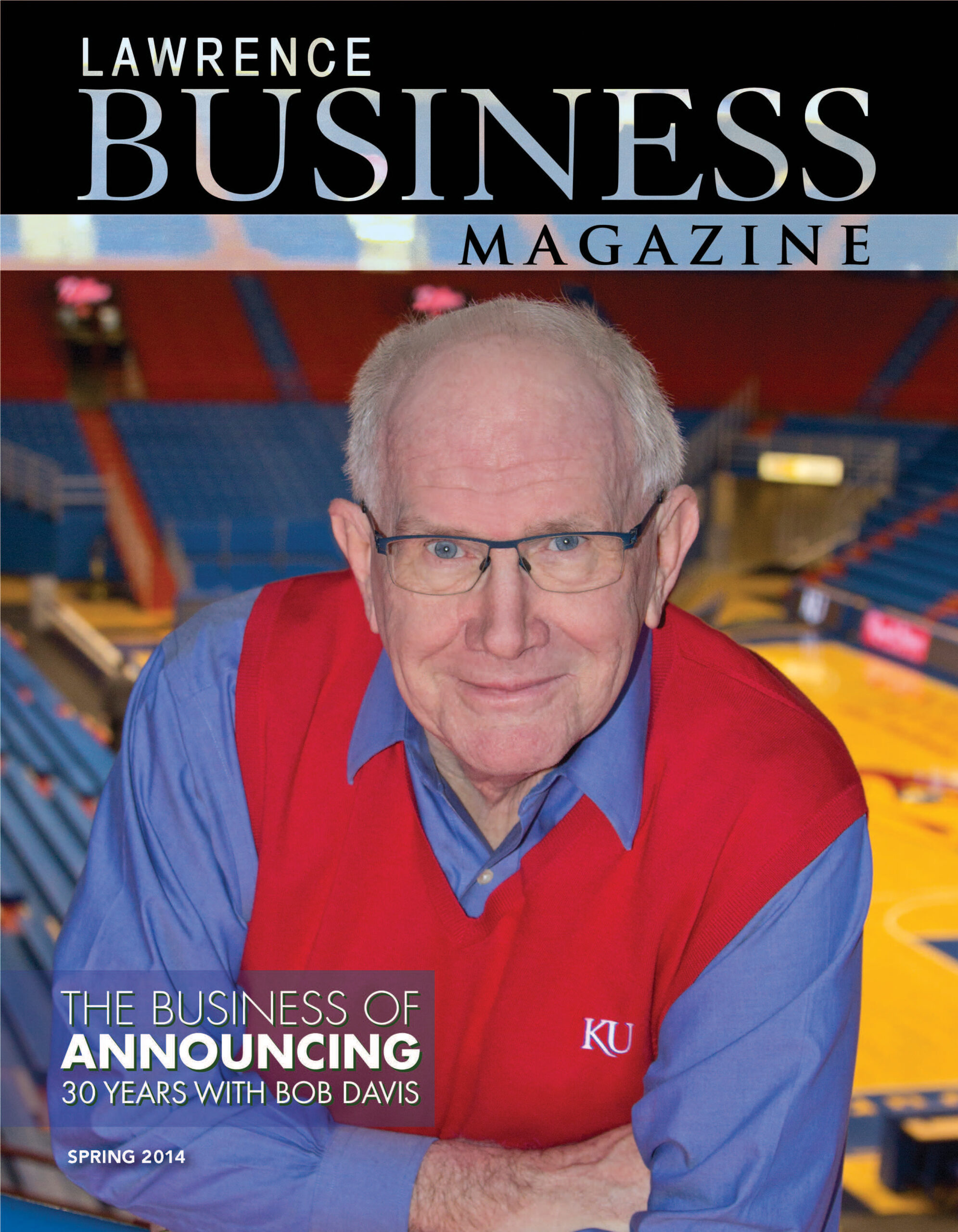
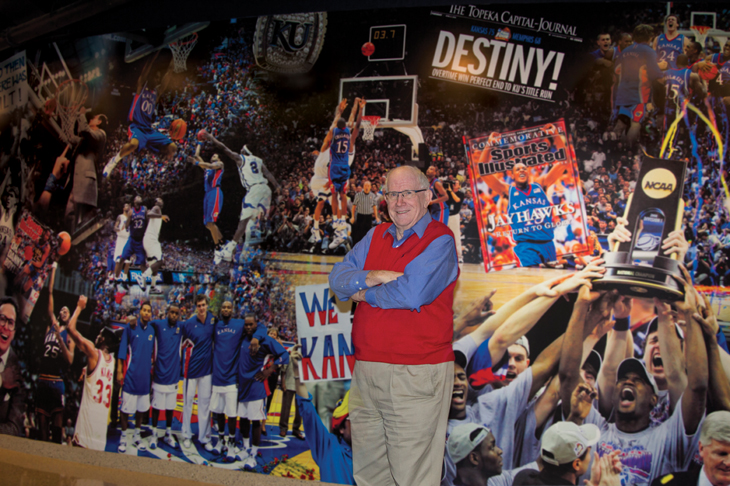
It is a question where the only right answer is your own.
How often should hall-of-fame radio broadcaster Bob Davis give the score during a University of Kansas basketball game?
Davis, who has been calling the action for Jayhawk fans for decades, ponders the question for a moment before offering his point of view.
“You cannot give the score too much,” he says. “No broadcaster I know has ever been criticized for doing that.”
Davis’ wife, Linda, all at once his most ardent fan and harshest critic, offers a lighthearted but no-less contrarian opinion.
“Bob doesn’t give you the score enough,” says Linda, a twinkle in her eye.
And so it goes for the venerable broadcaster, the man entrusted with providing fans with a words-eye view courtside at a basketball arena or serving as their pragmatic beacon of hope from a football stadium press box.
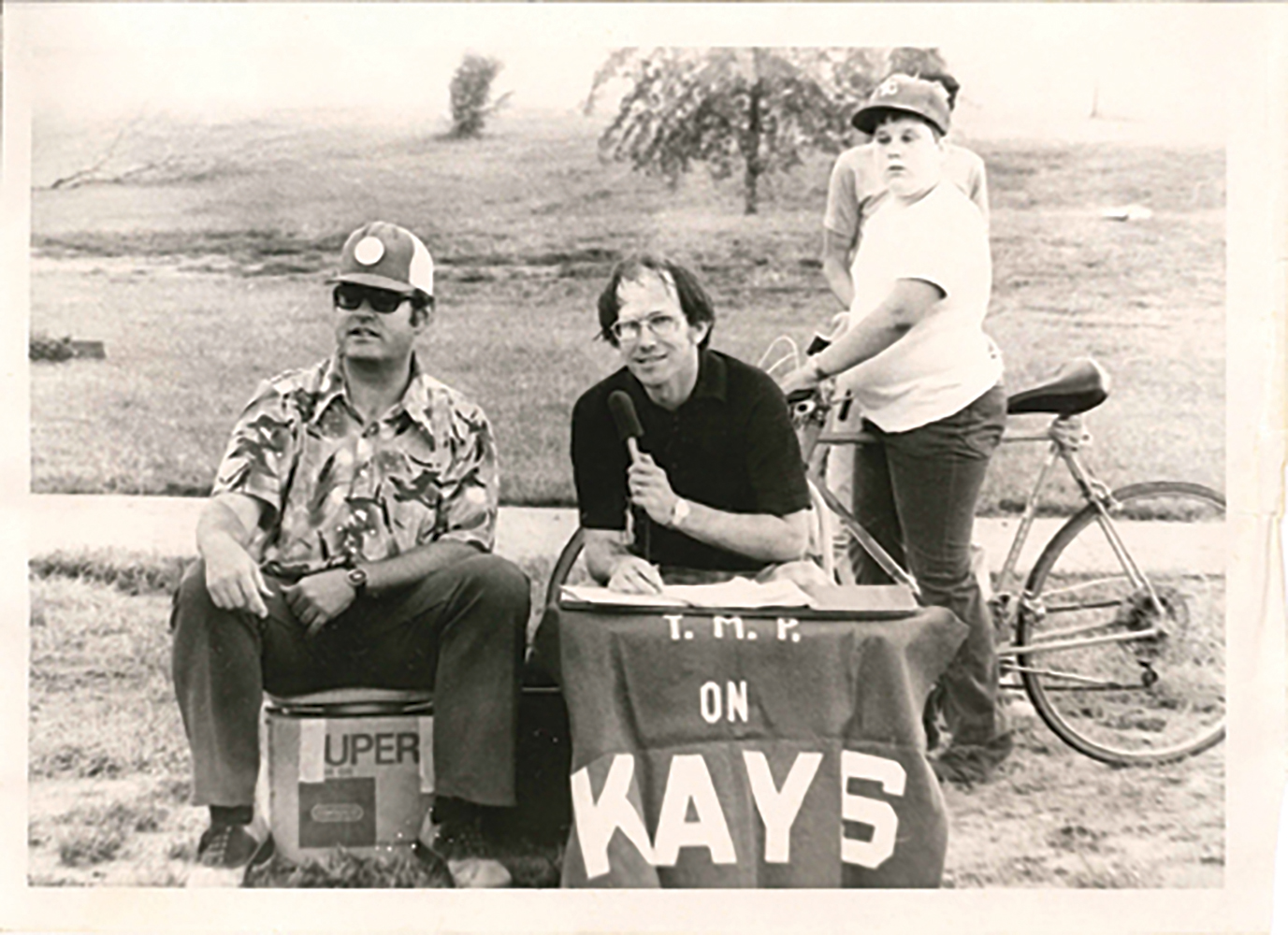
Bob Davis at Lemonade Stand in Johnson County
Late 70’s State Basketball Championship
Davis is in his 30th year calling the play-by-play for Kansas football and basketball, and 46th season overall in the business of sports broadcasting. He serves as host of the weekly radio call-in program HawkTalk, which features the Jayhawk football and basketball coaches. He retired last year as a Kansas City Royals announcer after 16 seasons behind the mike.
Born in Iola, Kansas, Davis the native son followed a blue-collar path from the grassroots up to the top of his profession as he sharpened the tools of his trade. In any given year during those early days, a listener could tune into the local radio station and hear him announce 50 to 60 basketball games a year or call play-by-play for college and high school football games on Friday nights and Saturday afternoons.
Davis claims he must have done more than a thousand minor league baseball games. Throw in American Legion Baseball, plus emceeing parades and sports banquets, guest speaking at high school sports functions and hosting award shows throughout Hays and every part of western rural Kansas, his voice has become synonymous with local sports.
KU Athletic Director Dr. Sheahon Zenger was only 4 years old when he first started listening to Davis broadcast college and high school football games on the radio out in Hays, Kansas. Then when Dr. Zenger played high school football, Davis called his games.
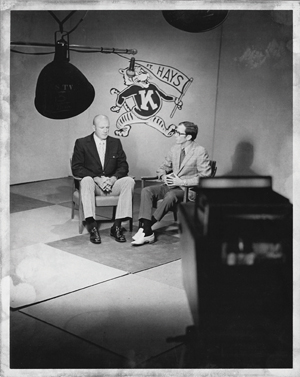
Bob Davis interviewing
Ft. Hays State Football Coach Bill Giles
“I still have cassette tapes my friends would record of Bob calling those games so my buddies and I could listen to them the next day while eating donuts,” Dr. Zenger says. “Those are some fond memories.”
“In 8th grade, listening to guys like Jack Buck, Harry Carey and Joe Garagiola, I knew I wanted to be a sports announcer,” Davis says.
And after graduating from Washburn University with a degree in History, then trying a year of law school, Davis decided to go for his passion. He got his first radio gig in Hays for TV/radio station KAYS. Davis worked a board shift, a three-hour time slot as a disc jockey, a TV news show and the weather updates. He also ran camera at 6 p.m., then again at 10 p.m. for the sports program.
“And I did this all for the princely sum of $400 a month,” Davis says.
It was the summer of 1968 in Hays, Kansas, when Davis got his break, doing play-by-play for the state American Legion Baseball tournament. The usual announcer was away for a funeral, so Davis told the station manager he would like to give it a try. He was knowledgeable about the sport at that point of his career, but had never broadcasted a single game. In fact, he was so inexperienced that the station had to send along another staffer to help him set up the equipment because, as Davis recalls, “I didn’t even know how to open up the door to get in.”
The station manager was adamant that Davis pronounce the names correctly, as the station’s owner was a stickler for getting it right. So before going to call his first game, the owner sat Davis down to go over the correct pronunciation of some of the more difficult player names. He reminded Davis, “I will be listening,” to which the smart aleck know-it-all young Davis replied, “Well, I hope so, it’s your station.” Davis is always quick to point out how lucky he was to break into sports broadcasting at a place like that where there were so many opportunities.
In those early years it was a family affair, as Linda was his statistician and spotter. She was a sports fan, so when they first started dating, it was a way for her to attend sporting events. But then it turned into a team effort.
“He asked me if I had ever spotted tackles,” Linda recalls, “I said no but I knew I could do it so I went with him and told him who made the tackle. And as the other statisticians were on the other side of the stadium, I became his statistician too.”
David Lawrence, a former KU all-Big 8 lineman, has been working with Davis for 20 years as an analyst and admits he has learned plenty about sports broadcasting from his veteran coworker. Lawrence reminds us that Davis was a well-respected announcer and journalist who, as he worked the smaller venues, honed his craft covering sporting events that young, aspiring announcers may scoff at today.
“I think now some young people think they are above doing that kind of stuff. He did the blue-color route to work his way up here,” Lawrence says. “Davis did it the hard way, but it also made him great.”
“I have always said about sportscasting, you can study it, read a book about it, you can have guys lecture to you about how to do it, but you’ve just got to do it,” Davis says. “I learned a lot about not only the broadcasting business, but business in general. The idea is to make a profit and serve your audience.”
Jason Booker, Executive Director of the Jayhawk Sports Network, believes Davis brings an illustrious history and knowledge of broadcasting to the network. His understanding of advertising and experience in knowing what the network is doing from day to day to bring in sponsorship revenue and working with their partners is invaluable. Booker says Davis is willing to do anything for the network or university.
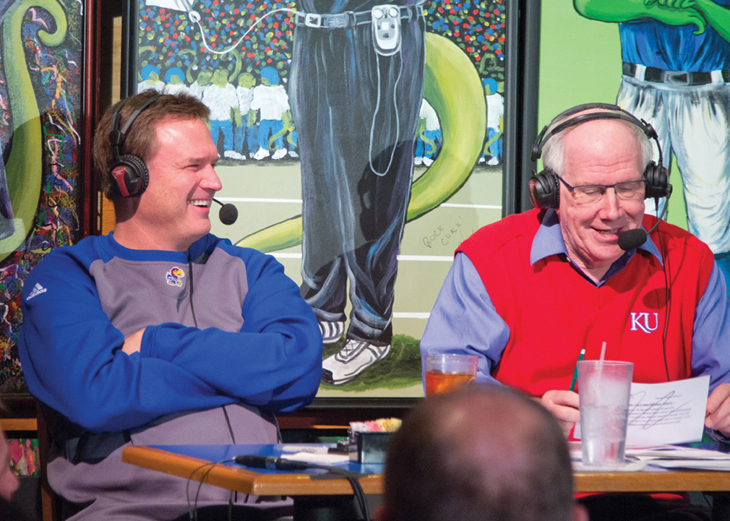
Coach Bill Self & Bob Davis at Hawk Talk
“Bob comes and speaks at our partner symposiums, and he understands the bigger picture of not just being a broadcaster, but being someone who is a representative of our university and the entire network, which includes helping us market our brand through our corporate sponsorships,” Booker says.
Dr. Zenger says Davis is a significant part of the athletic program’s brand.
“When you hear Bob’s voice, you know it’s KU,” Dr. Zenger says. “You don’t even have to introduce who he is. That’s just the voice that carries everything KU athletics.”
The IMG/Jayhawk Sports Network receives many requests from sponsors and partners for Davis to read their on-air ads and promos. The network manages 32 stations across the state and gives its partners like Pizza Hut, the Kansas State Lottery and Delta Dental a chance to reach into local communities. In fact, sports programming is one of the only events people still consume live, allowing for a direct dialog between the network’s partners and fans.
“Certainly when we have conversations with partners,” Booker adds, “they want to figure out a unique way to tie their brand closer to us, and what’s better than using Bob Davis, Bill Self, Glen Gurley, Dave Lawrence or Chris Piper to help promote that business.”
It is clear to Davis’ listeners that his passion for doing playby-play has never waned. “As the play-by-play guy,” Davis says, “your job is to grind away at the basics, what is the score, where are we in the ballgame, who’s ahead, where is the ball, and it is continuous bookkeeping. That is the challenge and the fun.”
“Theater of the mind” is what Linda Davis says her husband calls it. And if that were true, then Davis can be considered the Shakespeare of college basketball radio.
And radio is different than TV. Piper, who had worked a lot of TV before doing radio with Davis, points out one major difference: “On TV, you can go off and talk about something else while the game continues to be lousy. But if it’s a lousy game and you’re calling it for a radio audience, you still have to talk about it.”
“I just love radio,” Davis says. “We have so many means of communication now, but what could be better than a human voice. Radio is one-on-one communication.
You’re sitting with a guy in his car driving along, or the guy that has a radio in his shower — now how intimate is that?”
“I just love radio,” Davis says. “We have so many means of communication now, but what could be better than a human voice. Radio is one-on-one communication.
You’re sitting with a guy in his car driving along, or the guy that has a radio in his shower — now how intimate is that?”
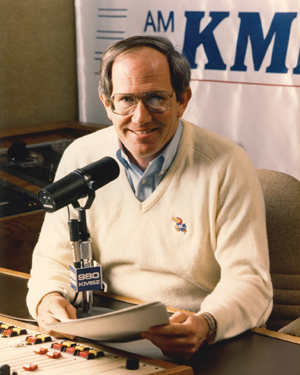
Bob Davis
Gurley is in his second year with Davis covering KU basketball. It is his first radio gig after doing TV for the Jayhawk Sports Network for 12 years.
“I wasn’t a radio guy and until I took this job,” Gurley says. “I didn’t understand how many people really enjoyed the radio over the television guys. You hear the word ‘legend’ a lot, and we have been fortunate to have Max Faulkenstein for 60 years and now Bob for 30. It’s fun to be able to go around to all these cities with Bob and see just how many people he knows and how respected he is.”
Many a local announcer with the cache Davis has would want to move over to a national network. But Davis says he never really wanted to do network broadcasting. Doing network requires the announcers to be impartial, and he says he always cared about who won.
He loves the relationship he has with his audience, but he also appreciates the relationships he develops by following a team year in and year out, building empathy for the players, traveling with them on the road and watching them grow under the guidance of potential future hall-offame coaches like Self, Roy Williams and Larry Brown. To Davis, this is one of the many aspects of the job that makes college broadcasting so rewarding.
“It’s such a fun deal to follow a team and build a relationship with your audience,” Davis says. “You have to be an objective observer of the game, that’s true, but it’s OK to want KU to win because most of our audience does too.”
When the basketball and football teams go on the road, so do Davis and the rest of the Jayhawk Sports Network team. Coach Self considers Davis an integral part of the Jayhawk basketball squad. “He travels with us and he eats with us, although that’s because all the meals are free,” Self says, with a grin. “Our players look to Bob and our radio team as being a part of our official travel party, just like our trainers and our associate athletic directors. Bob is the equivalent of all those guys.”
Faulkenstein, a retired hall-of-fame announcer, theorizes that what makes a great announcer is enthusiasm, accuracy and a knack for getting listeners to feel they are experiencing the emotions and thrills as though they are actually at the game. Davis says there are as many ways to be a good announcer as there are announcers. He has seen guys who are biased or down the middle, excitable, almost dull and, in every one of those types, he has seen someone go on to become successful.
“The big thing is to be who you are,” Davis says. “Don’t try to imitate (long-time Los Angeles Dodgers radio announcer) Vin Scully or someone you think is great,
because that is not you.”
Davis landed the job at KU in 1984. He had filled in for both Tom Hedrick and Faulkenstein, a few times driving all the way in from Hays to cover those games — again, putting in the hard work to get his next break.
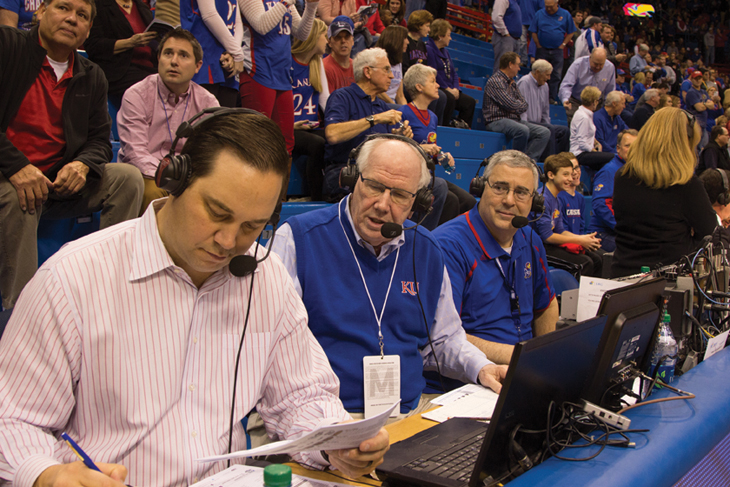
Greg Gurly, Bob Davis & Bob Newton
When Faulkenstein was first paired with Davis, he admits he was a little apprehensive about this new partnership. Davis was brought in to do play-by play and Faulkenstein was asked to transition from play-by-play guy, which he had been for 37 years, into the role of color analyst.
“Bob made the whole thing so easy, and he was such a fun guy to work with and he had a great sense of humor,” Faulkenstein says. “He was very
generous and kind to me so we started off on a good note, and that never
changed all those years we were together.”
Davis reflects on his pairing with Faulkenstein, saying the key to a successful partnership is the desire to see your partner to succeed. And with that mindset, the broadcast will thrive. And thrive Faulkenstein and Davis did, becoming the most memorable sports broadcasting duo in KU history.
“They were, without question, the most respected broadcast team in our conference,” Lawrence recalls. “When they walked into a press box, the opposing team’s athletic directors and sports information people would all come right up to those two. Max and Bob commanded everyone’s respect.” Walking the broadcaster’s razor’s edge of impartiality can be a tricky avenue for any seasoned reporter. So how does one be a pro-Kansas announcer yet still call a game objectively?
Another broadcaster with arguably some biased observations on Davis’ ability to straddle that fence is Steven Davis, Bob’s son and an accomplished announcer himself, with six seasons calling men’s basketball for the University of Missouri-KC, minor league baseball the past nine seasons and, starting this spring, KU baseball.
“Bob is just another fan, but he’s a fan with the mike, calling the game,” says the younger Davis. “Some people, especially fans of the other team, may not like it. They call it being a ‘homer,’ but that is what makes Bob great. His passion comes through, which I think is the most endearing quality about him. He’s a Jayhawk.”
Jayhawk Sports Network producer Bob Newton calls Davis a master of his craft, explaining that Davis paints pictures with words yet doesn’t go into excruciating detail that will go over the head of the casual fan.
“He is enthusiastic about our teams,” Newton says. “We are the Jayhawk Network, but he never calls us ‘we.’ Instead, he says, ‘That was a real turn of events if you are a Kansas fan.’ He refers to them as the Jayhawks, not ‘us.’”
Davis has been honored 13 times as Kansas Sportscaster of the Year. He is a two-time winner of the Oscar Stauffer Award for excellence in high school sports reporting, and he has received the Sportscaster of the Year Award from the Kansas High School Athletic Directors Association.
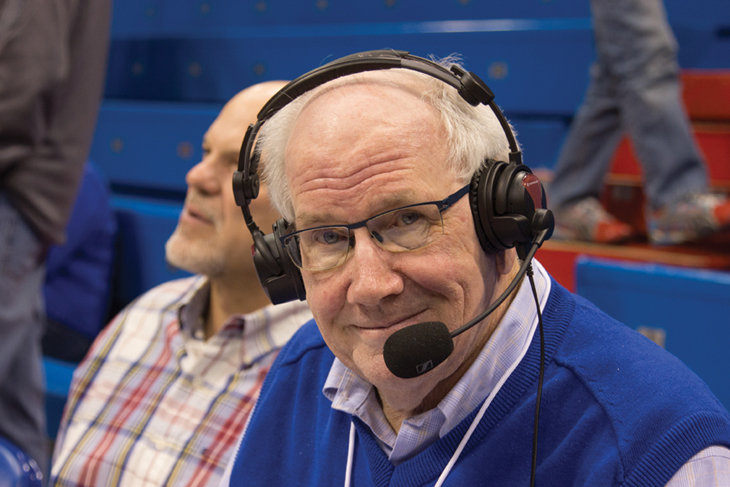
Bob Davis
The Kansas Association of Broadcasters (KAB) also recognized him for his contribution to Kansas sports broadcasting, presenting him with the Hod Humiston Award. And in 2007, in recognition of his accomplishments and contributions to the profession, Davis was inducted into the KAB Hall of Fame.
John Morris, the voice of the Baylor University Bears, has been an admirer of Davis since the inception of the Big 12 Conference in 1994 and calls him a “pro’s pro,” one of the real giants in the sports broadcasting world.
“I always try to tune into Bob’s broadcasts on satellite radio whenever possible because I enjoy listening to his work, and I definitely learn from him,” Morris says. “Kansas fans have been very fortunate to have Bob Davis relaying all the highlights of Jayhawk athletics for so many years.”
“Bob understands voice inflection, the impact of a play, and he knows how excited to get yet he’s spontaneous and thinks on his feet,” Lawrence adds. “And he knows his trade. He has great pipes, he admits he has a ‘radio face,’ and he certainly has radio pipes. He’s a legend.”
Coach Self calls Davis the consummate pro: “He doesn’t have bad days, and he’s always prepared. I wish I did my job as well as he does his. He’s as good as I have ever been around.”
Davis has been around. Thirty of those years have been here in Lawrence. His face may not be well known, but his voice is the sweet sound of one of Lawrence’s and Kansas’ finest commodities — Jayhawk basketball.
There is probably not a car speaker in any vehicle on any road here, or table radio in someone’s kitchen, that has not sang out with sweet anticipation and unbridled enthusiasm as Davis calls a game-winning shot for a KU basketball game.
Davis’ call from the 2008 NCAA Championship game that sent the contest into overtime: “Three-point lead, here they come… Collins, seven seconds to go in the game … Collins got pushed … falls down … Chalmers shoots … OHHHHHHH … a three!!!!! The game is tied … 2.1 seconds … Memphis inbounding … a half court shot … no good! Overtime, overtime!”
Davis takes a deep breath and clears his throat as he searches for the words to convey the reason why he loves what he does.
“Even today, people will come up to me and say, ‘You don’t know me but I really feel like I know you.’ And that is about the biggest compliment you could possibly receive — to have someone feel like they know you because they listened to you on the radio.”



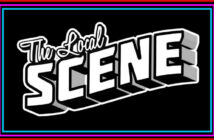

18 Comments
A motivating discussion is definitely worth comment. I believe that you need to write more on this subject matter, it might not be a taboo subject but usually people do not speak about these subjects. To the next! Best wishes!!
Looking forward to reading more. Great blog post.Really looking forward to read more. Awesome.
westpointe apartments rentberry scam ico 30m$ raised apartments for rent in new bedford ma
Hello there! I could have sworn Iíve been to this blog before but after looking at many of the articles I realized itís new to me. Anyhow, Iím definitely happy I stumbled upon it and Iíll be book-marking it and checking back frequently!
Muchos Gracias for your blog. Much obliged.
Really appreciate you sharing this article.Much thanks again. Really Cool.
Excellent post. I was checking continuously this blog and I am impressed!Very useful information particularly the last part 🙂 I care for such information much.I was seeking this particular info for a long time.Thank you and best of luck.
Im thankful for the article. Will read on…
What’s up mates, pleasant post and nice arguments commented here, I am genuinely enjoying by these.
Asking questions are really nice thing if you are not understanding something totally, however this articleprovides pleasant understanding yet.
Comfortable, good looking, functional watch. Nough said.
Thanks-a-mundo for the blog article.Much thanks again.
Thank you for some other excellent article. Where else may anyone get that type of information in such an ideal approach of writing? I have a presentation next week, and I am on the look for such info.
Hi there, after reading this amazing piece of writing i am also cheerful toshare my familiarity here with mates.
Im grateful for the blog.Much thanks again. Really Great.
There’s definately a lot to find out about this subject. I really like all the points you made.
You could definitely see your skills within the work you write.The arena hopes for even more passionate writers like you whoaren’t afraid to mention how they believe. All the time goafter your heart.
What’s up, everything is going perfectly here and ofcourse every one is sharing information, that’sgenuinely good, keep up writing.